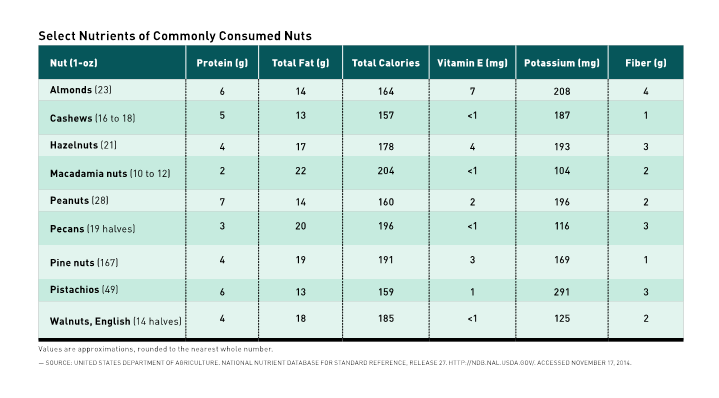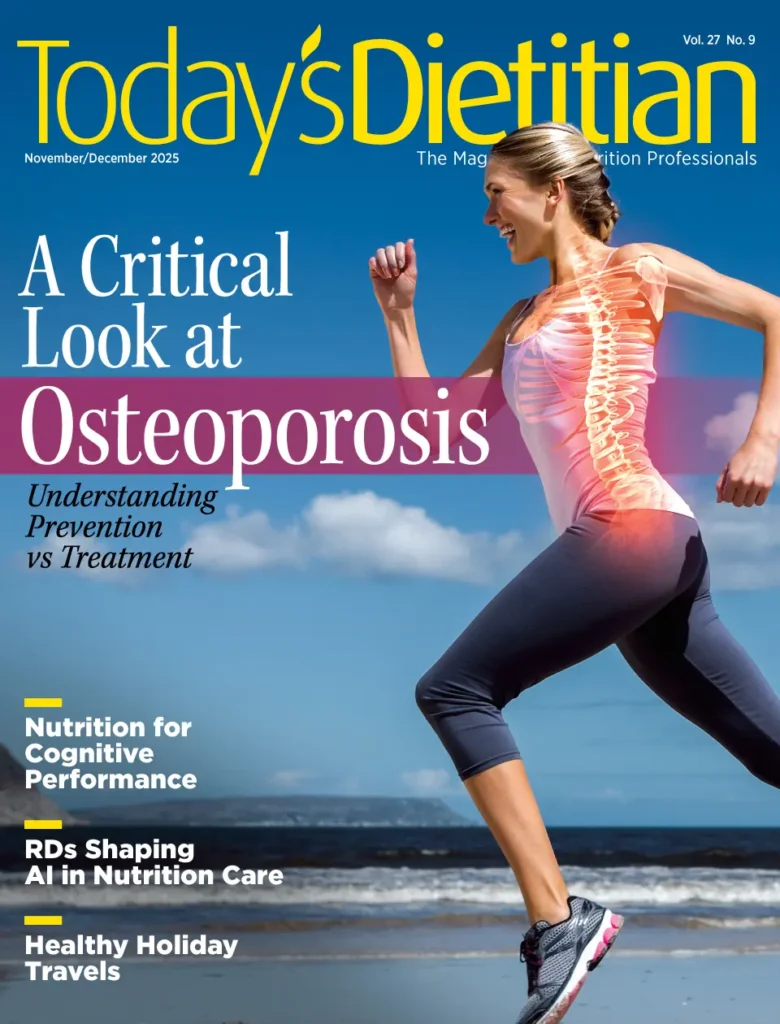Today’s Dietitian
Vol. 17 No. 1 P. 12
The good news about nuts and the role they play in enhancing heart health just got better with the recent release of a study on nut consumption and mortality in the New England Journal of Medicine, which showed that participants who ate the most nuts experienced a reduced risk of death due to all causes.1
Just a few decades ago nutrition guidelines for those with cardiovascular disease risk typically included a reduced-fat diet, and nuts were considered off limits. However, as researchers and health care professionals learned more about the role of good fats in cardiovascular health, the phobia about fat—and nuts—has waned. Yet many consumers still are confused and unfortunately believe that, although nuts are healthful, they’re too high in fat and calories to fit into their daily diet.
In the New England Journal of Medicine study, researchers tracked 76,464 female and 42,498 male subjects. Those who ate 1 oz of nuts per day, including peanuts and tree nuts, not only had a lower mortality risk than those who ate nuts less than once per week, they also were leaner. They had a smaller waist circumference and decreased obesity risk.1
While nuts contain approximately 13 to 18 g of fat and 160 to 200 kcal per 1-oz serving, the fat in most nuts, such as almonds, hazelnuts, peanuts, pecans, some pine nuts, pistachios, and walnuts, primarily is monounsaturated and polyunsaturated. Moreover, nuts provide 1 to 7 g of protein and 1 to 3 g of dietary fiber per ounce. They’re a delicious way for people to consume heart-healthy nutrients, such as unsaturated fats, fiber, vitamin E, potassium, L-arginine, phytosterols, and resveratrol.
Most nuts have an FDA-approved health claim that states, “Scientific evidence suggests but does not prove that eating 1.5 ounces per day of most nuts as part of a diet low in saturated fat and cholesterol may reduce the risk of heart disease.”2 Only almonds, hazelnuts, peanuts, pecans, some pine nuts, pistachio nuts, and walnuts feature the approved health claim, since these nuts all provide no more than 4 g of saturated fat per 50-g sample—which is a little more than 1.5 oz,2 or in most cases about one handful of nuts each day. Macadamia nuts and cashews are too high in saturated fat to qualify for the health claim, with 6 g and 4.5 g per 50-g serving, respectively. The 2010 Dietary Guidelines for Americans recommend nut consumption as part of a healthful diet.3 Because nuts are a nutrient-rich, cardioprotective food, RDs should help clients incorporate nuts into their diet.
What the Research Shows
Since the 1990s, starting with the Adventist Health Study, research on nuts and heart health has yielded positive results, showing a reduced heart disease risk and lower serum lipids in those who consume them.4,5 In the earliest study, among 31,208 subjects, those who ate nuts more than four times per week suffered fewer fatal coronary heart disease events.6 (Serving size wasn’t specified, since results were assessed using a food frequency questionnaire.) Four large epidemiologic studies, including the Adventist Health Study, Iowa Women’s Health Study, Nurse’s Health Study, and Physician’s Health Study, have measured the impact of nut consumption on cardiovascular health, showing an associated decreased heart disease risk among nut eaters.7 Researchers saw the greatest reduction in each of these studies among participants who ate more than five 1-oz servings of nuts, including peanuts and tree nuts, per week.7 (The Iowa Women’s and Adventist Health Studies assessed only frequency, not quantity of nuts consumed.)
Researchers believe there are many reasons why nuts may confer cardioprotection. Studies support the cholesterol-lowering effect of eating nuts regularly, which likely is associated with their heart-protective effects.5 Other studies have measured inflammatory markers and oxidation and found that lower levels of these clinical predictors of heart disease risk also were linked with increased nut consumption.5,8 It’s hypothesized that the fiber and other biologically active nutrients in nuts, possibly phytonutrients or antioxidants, may contribute to the significant reduction of various cardiovascular risk factors, such as high cholesterol and increased inflammation and oxidation.8
More recent research has examined the role nuts play in weight management and blood sugar control—each of which are independent risk factors for heart disease. Rick Mattes, MPH, PhD, RDN, distinguished professor of nutrition science in the department of nutrition science at Purdue University, says, “Studies have shown that nut consumption can improve lipid profiles, moderate swings in blood sugar, and may help to moderate weight.” He says most nuts, including peanuts and tree nuts, have similar nutritional profiles and have been shown to have comparable impacts on heart health. Mattes’ research indicates that eating nuts frequently doesn’t lead to increased body weight. He and his colleagues propose this is due to compensatory behavior—reducing calories during other meals and snacks to balance eating higher-calorie nuts—satiety factor, and the likelihood that not all calories eaten via nuts are absorbed.9
In addition, questions about the best way to consume nuts for optimal health remain, Mattes says. For example, it’s unknown whether nuts are most effective when eaten as a snack vs with a meal. And researchers are unsure about what the best portion size is and the form in which to eat nuts (eg, nut butter vs whole nut) to elicit the most positive outcomes.
Bottom Line
Even with these outstanding questions, the bottom line is that the research demonstrates the positive impact of nut consumption on heart health. Nuts are a delicious and nutritious food that clients and patients should incorporate frequently into their diet. Research suggests and guidelines recommend a portion size of 1.5 oz, approximately one palmful or 1/4 cup of most nuts, eaten more than five times per week for optimal health benefits. Many nuts and nut products are included in the American Heart Association’s Heart Check program, which can be an easy way to assist clients in making choices when shopping for heart-healthy nuts.
“I advise consumers to eat the nuts they enjoy most and can easily incorporate into meals and snacks since that improves the chances of getting them to eat them regularly,” says Robyn Flipse, MS, MA, RDN, a nutrition communications specialist in New York City. Likewise, Mattes says that since most nuts have similar health benefits it’s important to match the recommendations to the individual’s preference to maintain long-term behavior change. Flipse provides clients with guidelines for portion control to prevent overeating. She recommends using a portion-control container, placing a certain number of nuts into snack bags, or using a 1/4-cup scoop to serve themselves from a larger container.
“Think of nuts as a fabulous accessory when creating meals in your kitchen or when dining out,” says Carolyn O’Neil, MS, RD, author of The Slim Down South Cookbook. She suggests adding nuts to salads, cooked vegetables, pasta dishes, and even soups and stews to add crunch and flavor. “As with any fashion accessory, use just enough to liven up a dish, not weigh it down,” O’Neil says.
Nuts are versatile and familiar ingredients in culinary traditions from the United States to South and Central America to Asia and India. They’re also part of the Mediterranean diet, known for being a heart-healthy way of eating. Moreover, nuts are a feature in the DASH diet, shown to reduce hypertension. As with all nutrition behavior change, it’s important for dietitians to be culturally sensitive and to consider their clients’ cooking skills and budget constraints as well as product availability. Fortunately, nuts come in many different flavors, textures, and price points, and there are options that even the pickiest clients will go nuts over.
— Sherry Coleman Collins, MS, RDN, LD, is president of Southern Fried Nutrition Services in Atlanta, specializing in food allergies and sensitivities, digestive disorders, and nutrition communications.
References
1. Bao Y, Han J, Hu FB, et al. Association of nut consumption with total and cause-specific mortality. N Engl J Med. 2013;369(21):2000-2011.
2. Summary of qualified health claims subject to enforcement discretion: Nuts & heart disease. US Food and Drug Administration website. http://www.fda.gov/Food/IngredientsPackagingLabeling/LabelingNutrition/ucm073992.htm#nuts. Accessed November 9, 2014.
3. US Department of Agriculture, US Department of Health and Human Services. Dietary Guidelines for Americans, 2010. 7th ed. Washington, DC: US Government Printing Office; 2010.
4. Kelly JH Jr, Sabaté J. Nuts and coronary heart disease: an epidemiological perspective. Brit J Nutr. 2006;96(suppl 2):S61-S67.
5. Sabaté J, Ros E, Salas-Salvadó J. Nuts: Nutrition and health outcomes. Preface. Brit J Nutr. 2006;96(Suppl 2):S1-S2.
6. Fraser GE, Sabaté J, Beeson WL, Strahan TM. A possible protective effect of nut consumption on risk of coronary heart disease. The Adventist Health Study. Arch Intern Med. 1992;152(7):1416-1424.
7. Sabaté J, Ang Y. Nuts and health outcomes: new epidemiologic evidence. Am J Clin Nutr. 2009;89(5):1643S-1648S.
8. Kris-Etherton PM, Hu FB, Ros E, Sabaté J. The role of tree nuts and peanuts in the prevention of coronary heart disease: multiple potential mechanisms. J Nutr. 2008;138(9):1746S-1751S.
9. Mattes R, Kris-Etherton P, Foster G. Impact of peanuts and tree nuts on body weight and healthy weight loss in adults. J Nutr. 2008;138(9):1741S-1745S.
Additional Resources
• International Tree Nut Council Nutrition Research & Education Foundation (www.nuthealth.org)
• National Peanut Board (www.nationalpeanutboard.org)


